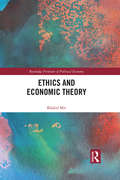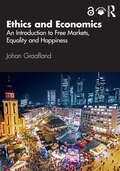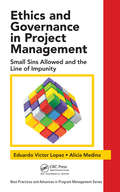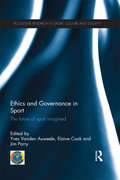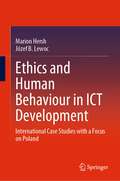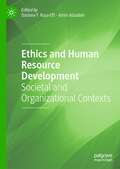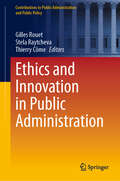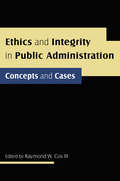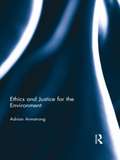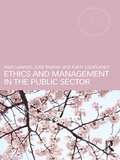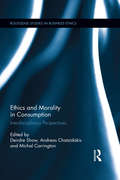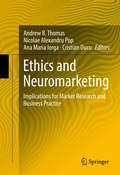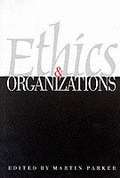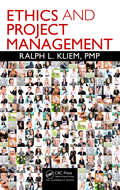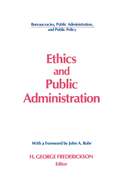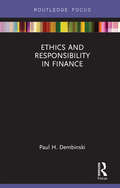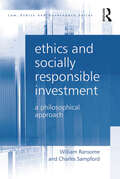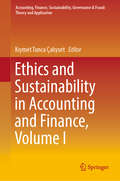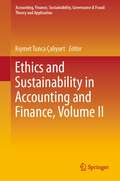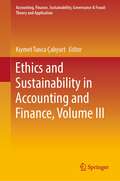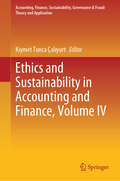- Table View
- List View
Ethics and Economic Theory (Routledge Frontiers of Political Economy)
by Khalid MirThis book takes a multi-disciplinary critique of economics’ first principles: the fundamental and inter-related structuring assumptions that underlie the neo-classical paradigm. These assumptions, that economic agents are rational, self-interested individuals, continue to influence the teaching of economics, research agendas and policy analyses. The book argues that both the theoretical understanding of the economy and the actual working of real-world market economies diminish the scope for thinking about the relation between ethics, economics, and the economy. It highlights how market economies may "crowd out" ethical behavior and our evaluation of them elides ethical reflection. The book calls for a more pluralistic and richer approach to economic theory, one that allows ample room for ethical considerations. It provides insight into understanding human motivations and human flourishing and how a good economy requires reflection on the ethical relations between the self, world, and time.
Ethics and Economics: An Introduction to Free Markets, Equality and Happiness
by Johan GraaflandThis textbook applies economic ethics to evaluate the free market system and enables students to examine the impact of free markets using the three main ethical approaches: utilitarianism, principle-based ethics and virtue ethics. Ethics and Economics systematically links empirical research to these ethical questions, with a focus on the core topics of happiness, inequality and virtues. Each chapter offers a recommended further reading list. The final chapter provides a practical method for applying the different ethical approaches to morally evaluate an economic policy proposal and an example of the methodology being applied to a real-life policy. This book will give students a clear theoretical and methodological toolkit for analyzing the ethics of market policies, making it a valuable resource for courses on economic ethics and economic philosophy.
Ethics and Economics: An Introduction to Free Markets, Equality and Happiness
by Johan GraaflandThis textbook applies economic ethics to evaluate the free market system and enables students to examine the impact of free markets using the three main ethical approaches: utilitarianism, principle-based ethics and virtue ethics.Ethics and Economics systematically links empirical research to these ethical questions, with a focus on the core topics of happiness, inequality and virtues. Each chapter offers a recommended further reading list. The final chapter provides a practical method for applying the different ethical approaches to morally evaluate an economic policy proposal and an example of the methodology being applied to a real-life policy.This book will give students a clear theoretical and methodological toolkit for analyzing the ethics of market policies, making it a valuable resource for courses on economic ethics and economic philosophy.The Open Access version of this book, available at http://www.taylorfrancis.com, has been made available under a Creative Commons Attribution-Non-Commercial (CC-BY-NC) 4.0 license.
Ethics and Finance
by John HendryEthics and Finance: An Introduction provides a comprehensive and accessible introduction to the ethical issues raised by modern finance. Drawing carefully on ethical theory and with frequent use of case studies, it includes an analysis of the global financial system and its regulation and control, as well as a detailed analysis of the financial crisis. Chapters on specific areas of finance practice cover all the major financial scandals of recent times, from mis-selling to market manipulation and from insider trading to bankers' bonuses, as well as much more positive developments. From micro finance to derivatives trading, the book provides a careful and balanced treatment designed to help finance students and practitioners approach this sensitive topic in a thoughtful and constructive way. No prior knowledge of ethics or finance is required, and the book will be invaluable to students, finance teachers, practitioners and regulators.
Ethics and Governance in Project Management: Small Sins Allowed and the Line of Impunity (Best Practices in Portfolio, Program, and Project Management #26)
by Eduardo Victor Lopez Alicia MedinaThis book shows executive, project, program, and portfolio managers how ethical behavior can ensure that an organization has proper governance. Improper governance and unethical behavior have led to such well-known financial disasters as Enron and Madoff Investments. The book arms managers with two important tools: Small Sins Allowed (SSA) and Line of Impunity (LoI), which together can be the foundation for renewed and vigorous corporate governance. SSA is a powerful tool that helps managers establish a level above which adherence to ethical standards is expected. LoI aids managers in identifying ethical fault lines that may exist in a company and helps to keep unethical behavior in check.
Ethics and Governance in Sport: The future of sport imagined (Routledge Research in Sport, Culture and Society)
by Elaine Cook Jim Parry Yves Vanden AuweeleWhat is, or what should be, the function of sport in a globalized, commercialized world? Why does sport matter in the 21st century? In Ethics and Governance in Sport: the future of sport imagined, an ensemble of leading international experts from across the fields of sport management and ethics calls for a new model of sport that goes beyond the traditional view that sport automatically encourages positive physical, psychological, social, moral and political values. Acknowledging that sport is beset by poor practice, corruption, and harmful behaviors, it explores current issues in sport ethics, governance and development, considering how good governance and the positive potentials of sport can be implemented in a globalized sporting landscape. Ethics and Governance in Sport suggests a future model of sport governance based on well substantiated projections, and argues that identifying the root causes of harmful behavior, those things that are characteristic of sport, and engaging sport managers, policy makers and leaders of sport organizations, is essential if sport is to thrive. The book’s interdisciplinary examination of sport, encompassing philosophy, sociology, economics, management and sport development, and its forward-looking approach makes it important reading for advanced students, researchers and policy makers with an interest in the place and development of modern sport. Its clear messages invite self-reflection and discussion, especially within sports organizations.
Ethics and Human Behaviour in ICT Development: International Case Studies with a Focus on Poland
by Marion Hersh Józef B. LewocEthics and Human Behaviour in ICT Development discusses ethics in a professional context and encourages readers to self-assessment of their own behaviour. It provides thought-provoking accounts of the little-known early history of technological development in information and communication technology (ICT) and the automation industry in Poland, with a focus on Wroclaw. The book provides a framework for understanding the relationship between ethics and behaviour, and analyses critically ethical and behavioural issues in challenging workplaces and social contexts. It includes:case studies from around the world, especially Poland, which illustrate the relationships between human behaviour and ethics;biographies of successful Polish ICT and automation leading designers;analysis of case studies of human behaviour and ethics in challenging industrial development and other environments; andillustrative practical applications alongside the theory of human behaviour and ethics. The authors demonstrate the ingenuity of the early Polish designers, programmers and other specialists in overcoming the shortage of components caused by import embargoes to enable Poland to develop its own computer industry. An example of this is Elwro, formerly the largest manufacturer of computers in Poland. The discussion of its growth illustrates the potential of human creativity to overcome problems. The discussion of its fall highlights the importance of ethical approaches to technology transfer and the dangers of a colonialist mentality. The book is designed for engineers, computer scientists, researchers and professionals alike, as well as being of interest for those broadly concerned with ethics and human behaviour.
Ethics and Human Resource Development: Societal and Organizational Contexts
by Darlene F. Russ-Eft Amin AlizadehThis book adds to the debate around HRD and ethical dimensions in the workplace, evaluating the micro and macro environments and their role in designing a moral organizational culture. It assesses contemporary issues such as CSR and DEI and culture and their impact on the organization and employees. Examining the definition, purpose, and scope of ethics applied in HRD, this book will offer readers an in-depth understanding of current and future ethical challenges in the workplace and in society. It will provide theoretical and practical knowledge for creating and sustaining ethical climates in organizations.
Ethics and Innovation in Public Administration (Contributions to Public Administration and Public Policy)
by Gilles Rouet Thierry Côme Stela RaytchevaThis edited volume analyzes the ethics of innovations in the public sector in Europe. The book presents a theoretical analysis of empirical cases, deepening the understanding of innovation in public administration by identifying common processes across various local contexts. It also delves into the study of the European Union's ethics and values, exploring their impact on innovation at both European and local levels. Additionally, the book features comprehensive case studies, encompassing different sectors, professions, and statuses within public administration, providing a multifaceted examination of innovation's complexities. By considering multiple perspectives, including those of citizens, politicians, managers, trade unions, NGOs, and political leaders, the book offers a holistic understanding of the ethical challenges associated with innovation in public administration. It also addresses intrapreneurship, successful initiatives, struggles and resistance to change, training for elected representatives, and the integration of an ethical approach into local authority communications. As such this volume will be an essential resource for scholars, practitioners, policymakers, and anyone navigating the intricate landscape of ethical decision-making in European public administration.
Ethics and Integrity in Public Administration: Concepts and Cases
by Raymond W Cox"Ethics and Integrity in Public Administration" presents cutting-edge perspectives on the role of ethics in public sector management - what it is and where it is going. The contributors include a cross-section of authoritative authors from around the globe, and from both the academy and government. They cover a wide range of topics, diverse theoretical and conceptual paradigms, and global examples, and provide a broader view than what is typically offered in other books. The book includes both theoretical insights and commentaries grounded in practice. Chapters are divided into three parts: Ethical Foundations and Perspectives, Ethical Management and Ethical Leadership, and International and Comparative Perspectives.
Ethics and Justice for the Environment
by Adrian ArmstrongExamining the issues of ethics and justice as they apply to the environment, this book starts from the observation that the parallel expositions of environmental ethics and environmental justice appear to have few points of contact. Environmental justice is highly politicized and concerned with human access to the environment and the unequal exposure to environmental pollution. It grew out of the US civil rights movement, the liberal tradition of rights, and Rawls’ description of justice as fairness. It is thus almost exclusively anthropocentric, and does not address the question of justice for the environment. By contrast environmental ethical studies are a wide ranging collection of approaches that are concerned with caring for the earth, and the justifications for it, but rarely consider the issue of justice. Although the two movements do not come together at the theoretical level, they do so at the grass roots activist level. An essential component of this study is thus to consider both the issues of grass roots action, and the application of the methods to actual case studies.This book finds a common ground between these two strands and so to develop a unified statement of justice for the environment that includes the insights of both approaches, particularly based on the 'capability ideas of justice' developed by Martha Nussbaum.
Ethics and Law
by W. Bradley WendelThis casebook provides an overview of the wide range of legal and ethical issues facing lawyers in practice. As did prior editions, the Fifth Edition integrates discussion of the ABA's Model Rules, the ALI's Restatement of the Law Governing Lawyers, as well as case law, statutory law, and regulatory law governing lawyers. Many sections of the book are expanded and updated, including discovery abuse, ethics in electronic discovery, advertising and the Internet, simultaneous representation of corporations and officers, prosecutorial misconduct, and legal advising by government lawyers.
Ethics and Management in the Public Sector (Masters in Public Management)
by Alan Lawton Julie Rayner Karin LasthuizenGrappling with ethical issues is a daily challenge for those working in organizations that deliver public services. Such services are delivered through an often bewildering range of agencies and amidst this constant change, there are fears that a public service ethos, a tradition of working in the public interest, becomes blurred. Using extensive vignettes and case studies, Ethics and Management in the Public Sector illuminates the practical decisions made by public officials. The book takes a universal approach to ethics reflecting the world-wide impact of public service reforms and also includes discussions on how these reforms impact traditional vales and principles of public services. This easy-to-use textbook is a definitive guide for postgraduate students of public sector ethics, as well as students of public management and administration more generally.
Ethics and Morality in Consumption: Interdisciplinary Perspectives (Routledge Studies in Business Ethics #8)
by Deirdre Shaw Andreas Chatzidakis Michal CarringtonEthical consumerism is on the rise. No longer bound to the counter-cultural fringes, ethical concerns and practices are reaching into the mainstream of society and being adopted by everyday consumers – from considering carbon miles to purchasing free-range eggs to making renewable energy choices. The wide reach and magnitude of ethical issues in society across individual and collective consumption has given rise to a series of important questions that are inspiring scholars from a range of disciplinary areas. These differing disciplinary lenses, however, tend to be contained in separate streams of research literature that are developing in parallel and in relative isolation. Ethics in Morality and Consumption takes an interdisciplinary perspective to provide multiple vantage points in creating a more holistic and integrated view of ethics in consumption. In this sense, interdisciplinary presupposes the consideration of multiple and distinct disciplines, which in this book are considered in delineated chapters. In addition, the Editors make an editorial contribution in the final chapter of the book by combining these separate disciplinary perspectives to develop a nascent interdisciplinary perspective that integrates these perspectives and presents platforms for further research.
Ethics and Neuromarketing
by Andrew R. Thomas Nicolae Alexandru Pop Ana Maria Iorga Cristian DucuThis book addresses the emerging field of neuromarketing, which, at its core, aims to better understand the impact of marketing stimuli by observing and interpreting human emotions. It includes contributions from leading researchers and practitioners, venturing beyond the tactics and strategies of neuromarketing to consider the ethical implications of applying powerful tools for data collection. The rationale behind neuromarketing is that human decision-making is not primarily a conscious process. Instead, there is increasing evidence that the willingness to buy products and services is an emotional process where the brain uses short cuts to accelerate the decision-making process. At the intersection of economics, neuroscience, consumer behavior, and cognitive psychology, neuromarketing focuses on which emotions are relevant in human decision-making, and uses this knowledge to make marketing more effective. The knowledge is applied in product design; enhancing promotions and advertising, pricing, professional services, and store design; and improving the consumer experience as a whole. The foundation for all of this activity is data gathering and analysis. Like many new processes and innovations, much of neuromarketing is operating far ahead of current governmental compliance and regulation and thus current practices are raising ethical issues. For example, facial recognition software, used to monitor and detect a wide range of micro-expressions, has been tested at several airports--under the guise of security and counterterrorism. To what extent is it acceptable to screen the entire population using these powerful and intrusive techniques without getting passengers' consent? Citing numerous examples from the public and private sectors, the editors and contributing authors argue that while the United States has catalyzed technological advancements, European companies and governments are more progressive when it comes to defining ethical parameters and developing policies. This book details many of those efforts, and offers rational, constructive approaches to laying an ethical foundation for neuromarketing efforts.
Ethics and Organizations
by Martin ParkerA compilation of academic articles on the connections between ethics and businesses, as well as other organizations.
Ethics and Pandemics: Interdisciplinary Perspectives on COVID-19 and Future Pandemics (Springer Series in Public Health and Health Policy Ethics)
by Andrew SolaThis book is for readers who wish to understand the ethical implications of the COVID-19 pandemic — holistically — on communities, politics, the economy, the environment, international relations, public health, and, most importantly, on their own lives and their own futures. It also helps readers to think through the wide-ranging ethical implications of the new age of global pandemics. The COVID-19 pandemic has transformed all of our lives to such an extent that no single publication will ever be able to capture its complexity. The book acknowledges this complexity by embracing interdisciplinary dialogue. It is open to diverse points of view, different ethical systems, and a wide variety of academic disciplines. It suggests three broad avenues to exploring the subject: Ethics for Pandemics: What ethical theories are useful for pandemic living?Ethics in Pandemics: How are long-standing ethical dilemmas revealed in pandemics? Ethics of Pandemics: How should politicians and public health professionals create ethical systems of pandemic management? Interdisciplinary perspectives are another key feature of the book and reflect the important insights that many academic disciplines — medical ethics and public health, history, political science, economics, behavioral and evolutionary psychology, and climate science — bring to bear on the subject. In the chapters, the author joins theory and practice, providing an overview of the major ethical theories: Kant and DeontologyUtilitarianism and Consequentialist EthicsSocial Contract TheoryEgoism and AltruismVirtue Ethics It then uses these theories to analyze both COVID-19 and also historical pandemics, including typhus, smallpox, the Black Death, HIV/AIDS, and polio. Ethics and Pandemics: Interdisciplinary Perspectives on COVID-19 and Future Pandemics prepares readers to better understand ethical living during times of crisis. While written for students pursuing any discipline, it is particularly suited for those seeking degrees in public health, health care, political science, and philosophy. Furthermore, non-specialized readers and members of the general public will find the book of interest.
Ethics and Project Management
by PMP, Ralph KliemEthics plays a critical role in project management, but all too often, its importance is overlooked. This benign neglect can result in serious consequences to individuals and organizations, ranging from tarnished reputations to civil and criminal liability. Ethics and Project Management demonstrates the importance of making ethics a key considerati
Ethics and Public Administration (Bureaucracies, Public Administration, And Public Policy Ser.)
by John A. Rohr H George Frederickson"Ethics and Public Administration" refutes the arguments that administrative ethics cannot be studied in an empirical manner and that empirical analysis can deal only with the trivial issues in administrative ethics. Within a theoretical perspective,the authors qualify their findings and take care not to over-generalise results. The findings are relevant to the practice of public administration. Specific areas addressed include understanding public corruption, ethics as control, and ethics as administration and policy
Ethics and Responsibility in Finance (Routledge Focus on Economics and Finance)
by Paul H. DembinskiFrom the mid-1970s until the crisis in 2007, the world of finance enjoyed thirty euphoric years as the general public, businesses and governments put their blind trust in financial techniques, professions and institutions. Shaken up by a structural crisis and a crisis of legitimacy, today’s financial sector can no longer afford to avoid the issues summed up by the key question: what is next for the role of ethics and responsibility in finance? Many see an unbridgeable gap between ethics and responsibility and financial practice. Ethics and Responsibility in Finance paves the way for the dialogue that is needed in order to solve the current problems and allow the return of a refined ethical thinking in the financial sector. This book opens with an in-depth analysis of the operational implications of two key notions: ethics and responsibility. It then addresses ethical dilemmas that are characteristic to each of the three actors involved in any financial transaction. This begins with the discussion of the dilemmas of the ultimate owner of funds: the individual or collective saver, as in the case of pension funds. The analysis then turns to financial intermediaries such as banks, insurance companies, asset managers, and consultants, who work in a web of different loyalties. Finally, the dilemmas of the user of funds are addressed – the household taking a mortgage, an enterprise or a public authority which borrows – all of which have to be clear on the reasons and values driving their decisions. This volume is of great interest to those who study banking, corporate finance and ethics philosophy.
Ethics and Socially Responsible Investment: A Philosophical Approach (Law, Ethics And Governance Ser.)
by Charles Sampford William RansomeThis volume breaks new ground by approaching Socially Responsible Investment (SRI) as an explicitly ethical practice in financial markets. The work explains the philosophical and practical shortcomings of ’long term shareholder value’ and the origins and conceptual structure of SRI, and links its pursuit to both its deeper philosophical foundations and the broader, multi-dimensional global movement towards greater social responsibility in global markets. Interviews with fund managers in the Australian SRI sector generate recommendations for better integrating ethics into SRI practice via ethically informed engagement with invested companies, and an in-depth discussion of the central practical SRI issue of fiduciary responsibility strengthens the case in favour of SRI. The practical and ethical theoretical perspectives are then brought together to sketch out an achievable ideal for SRI worldwide, in which those who are involved in investment and business decisions become part of an ’ethical chain’ of decision makers linking the ultimate owners of capital with the business executives who frame, advocate and implement business strategies. In between there are investment advisors, fund managers, business analysts and boards. The problem lies in the fact that the ultimate owners are discouraged from considering their own values, or even their own long term interests, whilst the others often look only to short term interests. The solution lies in the latter recognising themselves as links in the ethical chain.
Ethics and Sustainability in Accounting and Finance, Volume I (Accounting, Finance, Sustainability, Governance & Fraud: Theory and Application)
by Kıymet Tunca ÇalıyurtThis book discusses recent developments relating to ethical and sustainable issues in accounting & finance. Accounting is often seen as a technical discipline that records, classifies and reports financial transactions. However, since the financial information produced concerns all interest groups both within and outside the enterprise, accounting also has social characteristics and involves multi-faceted duties and responsibilities. As such, in addition to basic principles and accepted rules and standards in the field, this book focuses on the ethical aspects and fundamentals of this profession that accountants should also take into consideration, as this is the only way to build and preserve society’s confidence in accounting and increase its social credibility.
Ethics and Sustainability in Accounting and Finance, Volume II (Accounting, Finance, Sustainability, Governance & Fraud: Theory and Application)
by Kıymet Tunca ÇalıyurtThis book continues the discussion on recent developments relating to ethical and sustainable issues in accounting & finance from Ethics and Sustainability in Accounting and Finance, Volume I. Accounting is often seen as a technical discipline that records, classifies and reports financial transactions. However, since the financial information produced concerns all interest groups both within and outside the enterprise, accounting also has social characteristics and involves multi-faceted duties and responsibilities. As such, in addition to basic principles and accepted rules and standards in the field, this book focuses on the ethical aspects and fundamentals of this profession that accountants should also take into consideration, as this is the only way to build and preserve society’s confidence in accounting and increase its social credibility.
Ethics and Sustainability in Accounting and Finance, Volume III (Accounting, Finance, Sustainability, Governance & Fraud: Theory and Application)
by Kıymet Tunca ÇalıyurtThis book continues the discussion on recent developments relating to ethical and sustainable issues in accounting and finance from the book , Volumes I and II, looking into topics such as the importance of good governance in accounting, tax, auditing and fraud examination, ethics, sustainability, environmental issues and new technologies and their effects on accounting and finance, focusing in particular on environmental and sustainability reporting in the oil and gas and banking sectors. The book also considers the growing importance of audit quality in this time of the COVID-19 pandemic.
Ethics and Sustainability in Accounting and Finance, Volume IV (Accounting, Finance, Sustainability, Governance & Fraud: Theory and Application)
by Kıymet Tunca ÇalıyurtThis book continues the discussion on recent developments relating to ethical and sustainable issues in accounting and finance from Volumes I to III, looking into topics such as the importance of good governance in accounting, tax, auditing and fraud examination, ethics, sustainability, environmental issues, and new technologies and their effects on accounting and finance, focusing in particular on environmental and sustainability reporting in the oil and gas and banking sectors.
